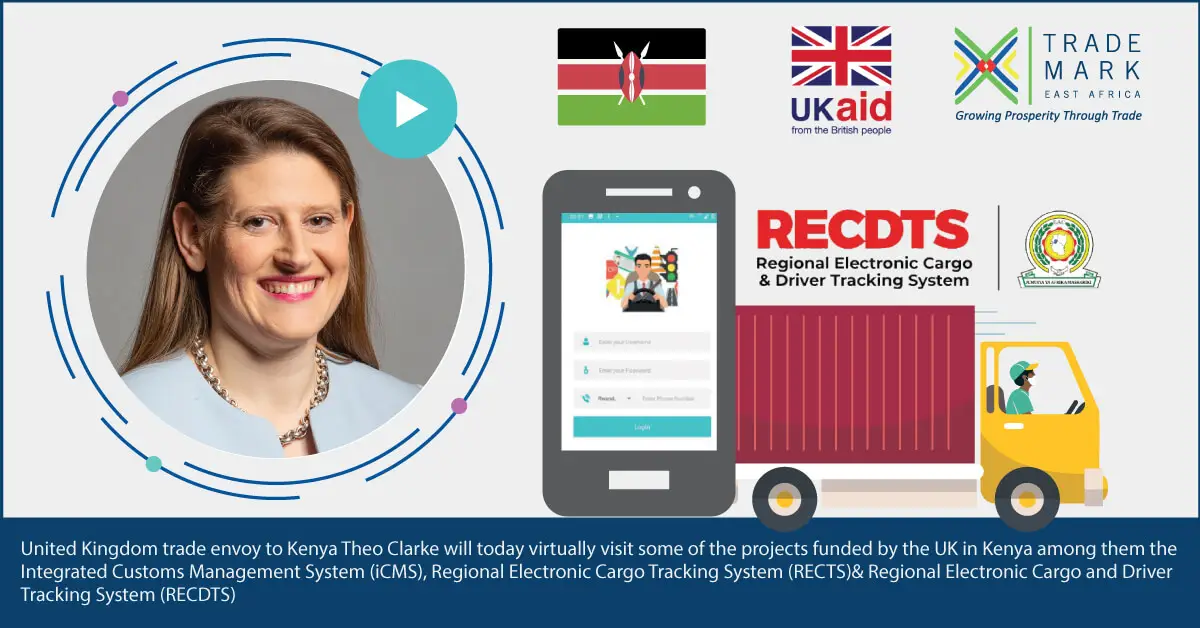26th February, Nairobi – United Kingdom (UK) Trade Envoy to Kenya Theo Clarke has today virtually visited projects funded by UK government in Kenya among them the Integrated Customs Management System (iCMS), Regional Electronic Cargo Tracking System (RECTS) and Regional Electronic Cargo and Driver Tracking System (RECTDS) implemented in partnership with the Kenya Revenue Authority (KRA).
Speaking during the virtual visit, attended by senior government officials and officials from TradeMark Africa (TMA), through which these projects were funded, the envoy underscored the special trade relationship between Kenya and the UK. Trade between the two nations was worth Ksh 79 billion in 2019 with the trade balance in favour of Kenya.
Main Kenyan exports to the UK in the year were coffee, tea and spices at Ksh 18.6 billion (£121 million), vegetables at Ksh 12.1 billion (£79 million) and live plants mainly flowers at Ksh 8.3 billion (£54 million). The UK market accounted for 43% of total exports from Kenya as well as 9% of her cut flowers. British firms sold East Africa’s leading economy goods worth Ksh 125 billion (£815 million) mainly in machinery, pharmaceuticals, and automobiles.
The UK is the largest European foreign investor in Kenya, with more than 100 British firms based in Kenya among them Vodafone, BAT, Diageo, Standard Chartered Bank, GlaxoSmithKline, ACTIS, Unilever and De La Rue.
The UK Prime Minister’s Trade Envoy to Kenya, Theo Clarke MP, said: “I am pleased that during the day of my first virtual visit as the Prime Minister’s Trade Envoy to Kenya I had the opportunity to meet with TradeMark Africa. It’s fantastic to see the great work that this UK-backed organisation is doing to reduce barriers to trade, this has the potential to enhance trade between both the UK and Kenya.”
The envoy was able to witness how the Integrated Customs Management System (iCMS) which went live in the last quarter of 2020, has greatly injected efficiency in customs administration, saving traders lot of time hitherto used while clearing cargo across various separate electronic platforms.
According to Kenya Revenue Authority (KRA) Acting Commissioner for Customs Pamela Ahago, under the previous system, direct assessment, valuation system, customs oil stock information, cargo management information system, electronic cargo tracking systems, customs ledger management module, air passenger service charge and real time monitoring system were all operating on different platforms a situation that has been addresses by the iCMS.
‘We anticipate the iCMS will reduce the cargo clearance time by 60%, allow pre-lodging of 80% of customs documents, link with the National Single Window thereby reducing complexity of traders obtaining official approvals, streamlining customs processes between Kenya and her neighbouring countries as well as sealing custom leaks’ explained Pamela.
The establishment of the Regional Electronic Cargo Tracking Systems in East Africa (RECTS) which was funded by the FCDO through TradeMark Africa to the tune of $4.5 million six years ago has also transformed movement of cargo along the Northern Corridor, by improving cargo predictability, truck turn around time, improved cargo security and reduced insurance premiums on cargo.
The final projected visited by the Trade Envoy was the Regional Electronic Cargo and Driver Tracking System (RECTDS), which leverages the RECTS platform and was partially funded by the FCDO as part of TMAs Safe Trade Emergency Facility. The project was launched in the wake of the Covid-19 pandemic and sought to address huge cargo truck tail backs experienced along most East African borders as governments sought to ascertain the health status of cargo crews.
The new system has ensured cargo crews are tested for Covid-19 before commencing their journeys and issued with electronic health certificates, which are verifiable by border officials, thereby eliminating the need for multiple tests and delays at the borders. By monitoring cargo truck and crew movement real time, has disincentivized cargo crews from engaging in risky unhealthy behaviour along the corridors and made them strictly adhere to health protocols issued by regional governments.
Speaking during the visit, TradeMark Africa Chief Executive Officer Frank Matsaert noted that the big investment by the UK government in the region has drastically reduced the cost of business in the region and enabled countries to trade more with each other.
“The UK Government investments in the central and northern corridors over the last decade has played a significant part in reducing time to transport a container on either corridor by at least 15% and reduced time taken to cross selected borders by upwards of 70%. The 2020 FCDO-funded independent evaluation of TMA’s Strategy 1 found significant time reductions in trade transport and processes and that TMA’s contribution to these was central. The study demonstrated that the main projects driving trade efficiency gains were trade, ICT and transport infrastructure (principally Mombasa Port, One Stop Border Posts – OSBPs) and ICT for Trade (e.g., customs management systems), all of which are significantly funded by the UK government” explained Frank.


